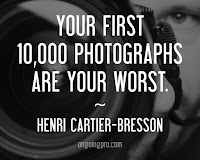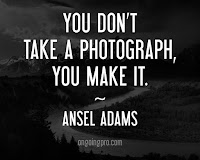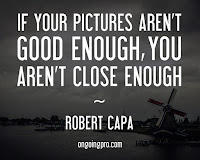"Photography
takes an instant out of time, altering life by holding it still."
-Dorothea Lange
Ahh.. So true. Photography is not only about capturing what you see. Photography is about expressing your emotions, your thought process, your state of mind. Writers write books to express themselves, dancers dance their hearts out, a sketch artists brings their sketches to life with their beautiful drawings, sculptors, magicians, painters, chefs, everybody has "outlets", if I may, for their emotions. Similarly we photographers express ourselves through the photographs we take. That's the the main reason I got into photography. I'm kind of an introvert so I wanted a medium through which I could express myself.. painting, dancing takes years to practice and decades to master. Hence photography.
 It was not like I always wanted to do Photography. Frankly I had no idea that this went this deep. It was only 3 years back I first tried used an SLR. My uncle who was practising photography at the time took me to his farm house, gave me his camera taught me the basics like exposure control and aperture and ISO and just told me to take pictures of whatever I felt like. I went around his farm and clicked a few pictures mostly nature and he was quite impressed. It was then I realised that I had the basic skill set of becoming a photographer and ever since that day I've been leaning the art of photography.
It was not like I always wanted to do Photography. Frankly I had no idea that this went this deep. It was only 3 years back I first tried used an SLR. My uncle who was practising photography at the time took me to his farm house, gave me his camera taught me the basics like exposure control and aperture and ISO and just told me to take pictures of whatever I felt like. I went around his farm and clicked a few pictures mostly nature and he was quite impressed. It was then I realised that I had the basic skill set of becoming a photographer and ever since that day I've been leaning the art of photography.
Photography is a very vast field. Oh my God you have no idea how many categories or genre of photography there are. Each with a unique style and specific equipments. For starters, there is
1. Fashion photography
2. Nature photography
 3. Wildlife photography
4. Black and White photography
5. Wedding photography
6. Travel Photography
7. Time Lapse photography and many many many more. Trust me there are so many more different kinds of photography. I would say there are at least another 30 kinds of photography. It's your choice what kind of photography you want to get into. No one can tell you what kind of a photographer you are. Oh no no. You have to find out for yourself. One can only guide you or give you some basic knowledge, tips on handling an SLR, some Dos and Donts. The basic stuff. And that is what I intend to do with this blog. If you like to do photography and been wanting to, hopefully this MIGHT help you to get a perspective and a rough idea of what its like.
3. Wildlife photography
4. Black and White photography
5. Wedding photography
6. Travel Photography
7. Time Lapse photography and many many many more. Trust me there are so many more different kinds of photography. I would say there are at least another 30 kinds of photography. It's your choice what kind of photography you want to get into. No one can tell you what kind of a photographer you are. Oh no no. You have to find out for yourself. One can only guide you or give you some basic knowledge, tips on handling an SLR, some Dos and Donts. The basic stuff. And that is what I intend to do with this blog. If you like to do photography and been wanting to, hopefully this MIGHT help you to get a perspective and a rough idea of what its like.
Choosing an Instrument:
A pen is to a Calligraphic artist is as a DSLR is to a photographer.
I started off with my uncles Nikon DSLR. I used it for almost a year before I bought my own. I would suggest you do the same. Just to be on a safer side. If you know what you're buying then chances of you regretting it will be virtually non existent. I'm sure at least one person you know has an SLR. Borrow it for a few days. It may be a Nikon or a Canon.
People often ask me which is better Nikon or Canon. It's like asking which is better Pepsi or Coca-cola or Samsung or Apple or PS4 or XBOX one. It's more like a personal preference. The camera I have currently is a Nikon but I personally prefer a Canon. It's all comes down to personal preference. Like any other products, each has its own advantages and disadvantages. Like for example a Nikon is simpler to use when compared to a Canon. On the contrary a Canon offers more features than a Nikon. I am of course talking about the entry level DSLRs (Digital Single-Lens Reflex cameras). Not even the semi professional ones. I am talking about the entry level cameras for people who are getting into photography.
So like I said It all comes down to personal preferences. The best advice I can give is borrow a camera for a few days and see which one you prefer. A Canon or a Nikon.
The Beginning of Photography:
 As I mentioned earlier, there are a lot of types of photography you can practice. If you ask me, the best way to begin photography is with bird photography. There is a very good reason behind this claim. As you begin using a DSLR (which isn't easy), there are things you have to do just before you take the picture. Like for instance adjust the exposure (shutter speed) which depends on the background. And controlling the ISO, and exposure component and depth of field. For the right photograph, you have to constantly keep on changing these parameters. How you know what parameters to vary how much to vary? By constantly using your DSLR. and I reckon starting off with bird photography will help you in a great way because birds are one of the most difficult to capture as they are constantly changing places.. Constantly flying off from one tree to another.. Which means the settings you adjusted to the previous frame is different from the current frame.. And most of the time you'll forget to change your settings. Doing bird photography requires a lot of patience, precision, and skill. At the same time you have to be quick with your equipment. Only when you get all these right, you get the PERFECT photograph and the amount of satisfaction you get when you capture the right one.. is unparalleled!
As I mentioned earlier, there are a lot of types of photography you can practice. If you ask me, the best way to begin photography is with bird photography. There is a very good reason behind this claim. As you begin using a DSLR (which isn't easy), there are things you have to do just before you take the picture. Like for instance adjust the exposure (shutter speed) which depends on the background. And controlling the ISO, and exposure component and depth of field. For the right photograph, you have to constantly keep on changing these parameters. How you know what parameters to vary how much to vary? By constantly using your DSLR. and I reckon starting off with bird photography will help you in a great way because birds are one of the most difficult to capture as they are constantly changing places.. Constantly flying off from one tree to another.. Which means the settings you adjusted to the previous frame is different from the current frame.. And most of the time you'll forget to change your settings. Doing bird photography requires a lot of patience, precision, and skill. At the same time you have to be quick with your equipment. Only when you get all these right, you get the PERFECT photograph and the amount of satisfaction you get when you capture the right one.. is unparalleled!
Buying The Right Lens:
DSLRs have interchangeable lenses. Meaning you can have multiple lens for a single body (body is what we refer to an SLR without the lens). Usually you'll get an 18-55mm (read as 18 to 55 mm) lens with your body. We call it a kit-lens. A kit-lens is the lens you get when you buy the camera.. The term "mm" refers to he focal length of the lens. It basically tells us the zoom capacity if the lens. Bigger the number higher is the zooming capacity. As simple as that. Sometimes you'll get 2 kit-lens with your camera (depends on the promotional offers offered by the respective companies). The second kit-lens you get is usually a 55-200mm lens. If you ask me you at least have to have a 300mm lens to do bird photography. 200mm is kind of pushing it. So I suggest.. Buy a body with the 18-55mm kit-lens and invest in a 70-300mm lens.
 The Other Things:
The Other Things:
"The other things" refer to the commodities that keep your camera and lens clean. You should NEVER touch the lens let alone clean it with your cleaning cloth. You get specialised equipments to do that.. Such as a lens pen (used to clean the lens), a blower (used to blow off dust from your camera and lens), a special cleaning cloth, and so on. These things are not at all expensive and it is highly recommended if you want to maintain your equipment. Other "other things" include tripods, filters, wireless utilities, GPS devices and so on (more on that later).
So, conclusion.. You have you Camera, your lens, your goals and your vision. So what are you waiting for? The time is now. Photography is a beautiful thing. Once you begin you never stop. Grab your camera, put on your thinking hat and just go with it!
If i have left out on anything, please feel free to ask me anything. If you have any suggestions, please done hesitate to ask me.
 It was not like I always wanted to do Photography. Frankly I had no idea that this went this deep. It was only 3 years back I first tried used an SLR. My uncle who was practising photography at the time took me to his farm house, gave me his camera taught me the basics like exposure control and aperture and ISO and just told me to take pictures of whatever I felt like. I went around his farm and clicked a few pictures mostly nature and he was quite impressed. It was then I realised that I had the basic skill set of becoming a photographer and ever since that day I've been leaning the art of photography.
It was not like I always wanted to do Photography. Frankly I had no idea that this went this deep. It was only 3 years back I first tried used an SLR. My uncle who was practising photography at the time took me to his farm house, gave me his camera taught me the basics like exposure control and aperture and ISO and just told me to take pictures of whatever I felt like. I went around his farm and clicked a few pictures mostly nature and he was quite impressed. It was then I realised that I had the basic skill set of becoming a photographer and ever since that day I've been leaning the art of photography. 3. Wildlife photography
3. Wildlife photography As I mentioned earlier, there are a lot of types of photography you can practice. If you ask me, the best way to begin photography is with bird photography. There is a very good reason behind this claim. As you begin using a DSLR (which isn't easy), there are things you have to do just before you take the picture. Like for instance adjust the exposure (shutter speed) which depends on the background. And controlling the ISO, and exposure component and depth of field. For the right photograph, you have to constantly keep on changing these parameters. How you know what parameters to vary how much to vary? By constantly using your DSLR. and I reckon starting off with bird photography will help you in a great way because birds are one of the most difficult to capture as they are constantly changing places.. Constantly flying off from one tree to another.. Which means the settings you adjusted to the previous frame is different from the current frame.. And most of the time you'll forget to change your settings. Doing bird photography requires a lot of patience, precision, and skill. At the same time you have to be quick with your equipment. Only when you get all these right, you get the PERFECT photograph and the amount of satisfaction you get when you capture the right one.. is unparalleled!
As I mentioned earlier, there are a lot of types of photography you can practice. If you ask me, the best way to begin photography is with bird photography. There is a very good reason behind this claim. As you begin using a DSLR (which isn't easy), there are things you have to do just before you take the picture. Like for instance adjust the exposure (shutter speed) which depends on the background. And controlling the ISO, and exposure component and depth of field. For the right photograph, you have to constantly keep on changing these parameters. How you know what parameters to vary how much to vary? By constantly using your DSLR. and I reckon starting off with bird photography will help you in a great way because birds are one of the most difficult to capture as they are constantly changing places.. Constantly flying off from one tree to another.. Which means the settings you adjusted to the previous frame is different from the current frame.. And most of the time you'll forget to change your settings. Doing bird photography requires a lot of patience, precision, and skill. At the same time you have to be quick with your equipment. Only when you get all these right, you get the PERFECT photograph and the amount of satisfaction you get when you capture the right one.. is unparalleled!






0 comments:
Post a Comment